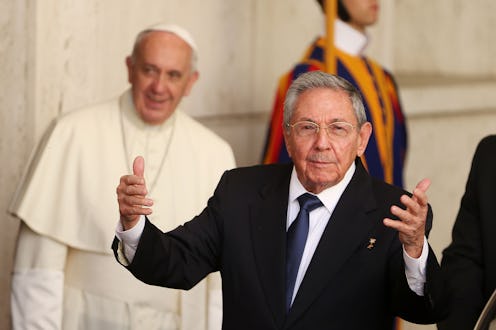News
Raul Castro Was Really Impressed By Pope Francis
Despite the Vatican’s stern denouncement of Cuba’s treatment of dissidents, Pope Francis has won the respect of President Raul Castro. In fact, Castro’s visit to the Vatican Sunday left him with such a good impression of Francis that the Cuban leader said he might consider returning to the Catholic Church. The one-hour meeting, conducted in the pope’s studio near the Vatican’s public audience hall, also saw Castro thanking Francis for the Vatican’s involvement in brokering the recent U.S.-Cuba diplomatic thaw. “If the pope keeps going the way he’s going, I’ll come back to the Catholic Church,” Castro later told reporters.
The comments came during a news conference at the office of Matteo Renzi, Italy’s prime minister, with whom Castro conducted discussions after his Vatican visit. “When the pope goes to Cuba in September, I promise to go to all his masses, and with satisfaction,” Castro continued. Francis is due to go to Cuba on his way to the United States later in the year. “I read all the speeches of the pope, his commentaries, and if the pope continues this way, I will go back to praying and go back to the church, and I'm not joking,” Castro said.
The comments are remarkable, considering that the Vatican has previously directed strongly worded criticism at Cuba’s human rights record. Castro’s praise for the pope and the church is rendered even more unusual due to Cuba’s somewhat restrictive approach to the right of freedom of religion. The Miami Herald reports that Cuban law currently allows Roman Catholics to practice their religion, but forbids them from spreading their message outside of Catholic communities, via mainstream radio or television broadcasts.
“There is freedom of cult, but not freedom of religion, because priests cannot evangelize outside the walls of their churches,” Froilán Dominguez, a former priest and seminary president in Cuba, told the Herald. Dominguez predicted that, come his September visit, “Francis will have considerable leverage to ask for religious freedoms, such that to evangelize without government censorship.”
Francis’ predecessor, Pope John Paul II, made a pilgrimage to Cuba in 1998, after Fidel Castro relaxed the state approach to religion by dialing down the country’s official position from atheist to secular. “Let Cuba open itself to the world, and let the world open itself to Cuba,” John Paul II urged during that trip. He was accompanied on the 1998 pilgrimage, presciently, by then-auxiliary bishop of Buenos Aires, Jorge Bergoglio. Today, we know Bergoglio as Pope Francis.
John Paul’s visit has been hailed as shifting the relationship between Cuba and the Catholic church. “When [John Paul II] went to Cuba, it made it okay for Catholics to go to church and be Catholic,” Archbishop Thomas Wenski of Miami, a city that's home to a huge Cuban diaspora, told The Huffington Post last year. Francis’ visit could further expand those freedoms.
Castro alluded to this gradual shift in his Sunday comments. “I am from the Cuban Communist party, that doesn’t allow [religious] believers, but now we are allowing it, it’s an important step,” he said. He commended Francis for “his wisdom, his modesty, and all his virtues that we know he has.” Francis has already had an impact on Cuban policy, having personally assisted in the extended secret negotiations that resulted in the restoration of U.S.-Cuba diplomatic restorations in 2014. The thaw comes after over 50 years of bitter political stalemate.
Castro thanked the pope for those efforts, and gifted him with a bittersweet artwork: a cross composed of relics from wrecked boats depicting a migrant in prayer, and a medal of Havana Cathedral. Francis, in return, gave Castro a medal featuring St. Martin of Tours — a saint known for tending to the poor.
Fidel Castro, leader of the guerrilla movement that brought about Cuba’s revolution, met with John Paul at the Vatican in 1996. This encounter preceded John Paul’s visit to the Caribbean island — the first ever made by a pope. His successor, Benedict XVI, also visited Cuba, in 2012. Francis’ September visit will thus make him the third pontiff to travel to the island.
On Sunday, Castro told reporters that “we are trying to carry forward improvements of our political, social and cultural system. But it's very difficult to do it without causing shocks, without leaving some in the street.”
Images: Getty Images (3)
